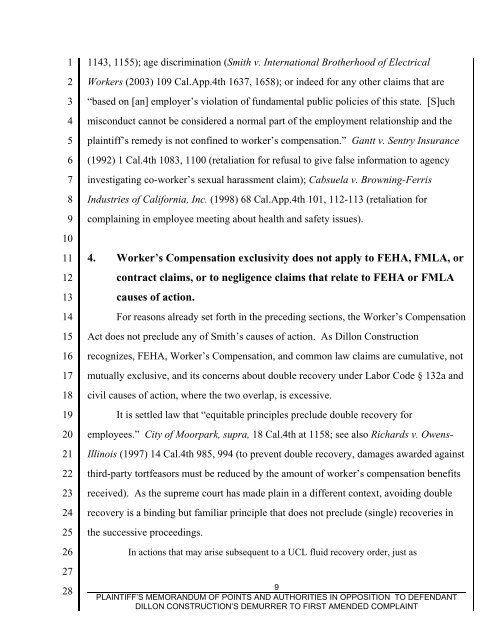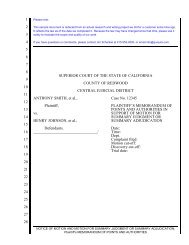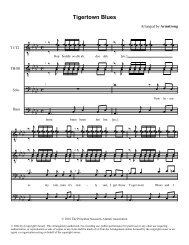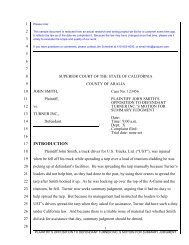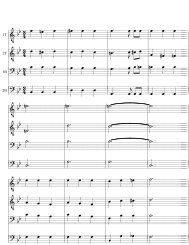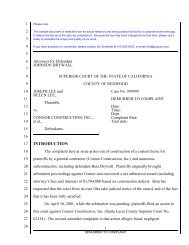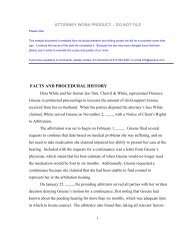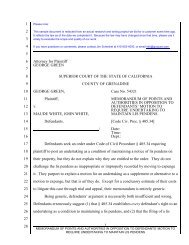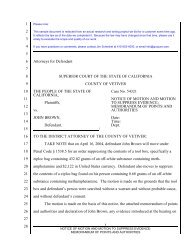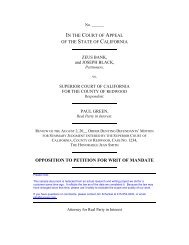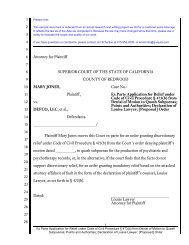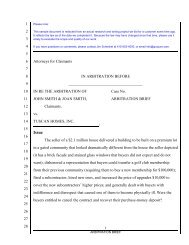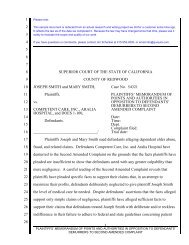demurrer - Quo Jure Corporation
demurrer - Quo Jure Corporation
demurrer - Quo Jure Corporation
You also want an ePaper? Increase the reach of your titles
YUMPU automatically turns print PDFs into web optimized ePapers that Google loves.
1<br />
2<br />
3<br />
4<br />
5<br />
6<br />
7<br />
8<br />
9<br />
10<br />
11<br />
12<br />
13<br />
14<br />
15<br />
16<br />
17<br />
18<br />
19<br />
20<br />
21<br />
22<br />
23<br />
24<br />
25<br />
26<br />
27<br />
28<br />
1143, 1155); age discrimination (Smith v. International Brotherhood of Electrical<br />
Workers (2003) 109 Cal.App.4th 1637, 1658); or indeed for any other claims that are<br />
“based on [an] employer’s violation of fundamental public policies of this state. [S]uch<br />
misconduct cannot be considered a normal part of the employment relationship and the<br />
plaintiff’s remedy is not confined to worker’s compensation.” Gantt v. Sentry Insurance<br />
(1992) 1 Cal.4th 1083, 1100 (retaliation for refusal to give false information to agency<br />
investigating co-worker’s sexual harassment claim); Cabsuela v. Browning-Ferris<br />
Industries of California, Inc. (1998) 68 Cal.App.4th 101, 112-113 (retaliation for<br />
complaining in employee meeting about health and safety issues).<br />
4. Worker’s Compensation exclusivity does not apply to FEHA, FMLA, or<br />
contract claims, or to negligence claims that relate to FEHA or FMLA<br />
causes of action.<br />
For reasons already set forth in the preceding sections, the Worker’s Compensation<br />
Act does not preclude any of Smith’s causes of action. As Dillon Construction<br />
recognizes, FEHA, Worker’s Compensation, and common law claims are cumulative, not<br />
mutually exclusive, and its concerns about double recovery under Labor Code § 132a and<br />
civil causes of action, where the two overlap, is excessive.<br />
It is settled law that “equitable principles preclude double recovery for<br />
employees.” City of Moorpark, supra, 18 Cal.4th at 1158; see also Richards v. Owens-<br />
Illinois (1997) 14 Cal.4th 985, 994 (to prevent double recovery, damages awarded against<br />
third-party tortfeasors must be reduced by the amount of worker’s compensation benefits<br />
received). As the supreme court has made plain in a different context, avoiding double<br />
recovery is a binding but familiar principle that does not preclude (single) recoveries in<br />
the successive proceedings.<br />
In actions that may arise subsequent to a UCL fluid recovery order, just as<br />
9<br />
PLAINTIFF’S MEMORANDUM OF POINTS AND AUTHORITIES IN OPPOSITION TO DEFENDANT<br />
DILLON CONSTRUCTION’S DEMURRER TO FIRST AMENDED COMPLAINT


